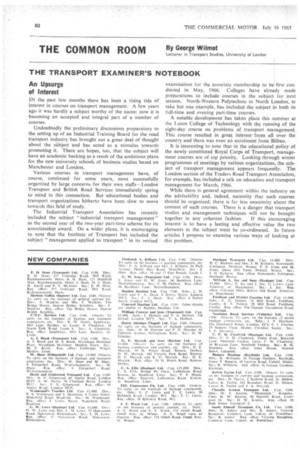THE COMMON ROOM
Page 82

If you've noticed an error in this article please click here to report it so we can fix it.
By George Wilmot
Lecturer in Transport Studies, University of Londor.
THE TRANSPORT EXAMINER'S NOTEBOOK
An Upsurge of Interest
IN the past few months there has been a rising tide of interest in courses on transport management. A few years ago it was hardly a subject worthy of the name: now it is becoming an accepted and integral part of a number of courses.
Undoubtedly the preliminary discussions preparatory to the setting up of an Industrial Training Board for the road transport industry has brought out a great deal of thought about the sithject and has acted as a stimulus towards promoting it. There are hopes, too, that the subject will have an academic backing as a result of the ambitious plans for the new university schools of business studies based on Manchester and London.
Various courses in transport management have, of course, continued for some years, most successfully organized by large concerns for their own staffs—London Transport and British Road Services immediately spring to mind in this connection. But educational bodies and transport organizations hitherto have been slow to move towards this field of study.
The Industrial Transport Association has recently included the subject "industrial transport management" as the second year of the two-year part-time scheme for its associateship award. On a wider plane, it is encouraging to note that the Institute of Transport has included the subject "management applied to transport" in its revised examination for the associate membership to be first conducted in May, 1966. Colleges have already made preparations to include courses in the subject for next session. North-Western Polytechnic in North London, tc take but one example, has included the subject in both its full-time and evening part-time courses.
A notable development has taken place this summer at the Luton College of Technology with the running of the eight-day course on problems of transport management. This course resulted in great interest' from all over the country and there was even an enrolment from Bilbao.
It is interesting to note that in the educational policy of the newly constituted Royal Corps of Transport, management courses are of top priority. Looking through winter programmes of meetings by various organizations, the subject of transport management appears frequently. The. London section of the Traders Road Transport Association, for example, has included a talk on education and transport management for March, 1966.
While there is general agreement within the industry on the advisability and, indeed, necessity that such courses should be organized, there is far less unanimity about the content of such courses. There is a danger that transport studies and management techniques will not be brought together in any coherent fashion. If this encouraging interest is to have a lasting and effective value the two elements in the subject must be co-ordinated. In future articles I propose to examine various ways of looking at this problem.




























































































































